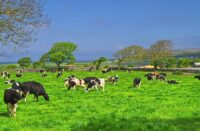Comrade Robert Navan’s letter in the May issue of Socialist Voice raises some interesting questions that go to the core of Marxism. It is appropriate that he raised them in the month of the 200th anniversary of Karl Marx’s birth in Trier in Germany. The agricultural question was one that led the young Marx to a study of political economy and the whole system of capitalism.
Marx became a doctor of philosophy in 1841, at the age of twenty-three. Because of a crackdown by the Prussian authorities on radicals, an academic career was closed to him, so he took up journalism.
In October 1842 he was editor of the Rheinische Zeitung, which represented the new liberal middle classes. He wrote an article for the paper entitled “Debates on the Law of Thefts of Wood.” In writing this article Marx was taking up the cause of the poor and also addressing a major issue in Prussia and the Rhineland.
No less than 83 per cent of prosecutions in Prussia, and even more in the Rhineland, were for thefts of wood. Traditionally, fallen or dead wood was free to be collected by anyone, but the growth of capitalism and the system of private property was trying to put an end to this. The wood was used by the poor for cooking and heating; now landowners were denying the poor access to anything in the forests as they sought to extend the rights of private property with laws against trespassing and hunting.
The new film by Raul Peck, The Young Karl Marx, in its opening scenes shows this attack by the landowners on the poor as they gather dead wood. Before Marx, Gracchus Babeuf had seen the same thing happening in pre-revolutionary France. The aristocrats, as they sought to codify their feudal “rights,” added in so-called rights to dead wood, fallen apples, etc., which had traditionally belonged to anyone.
Even today in India the Maoists are resisting the encroachment by transnational companies, such as Monsanto, on tribal territories, destroying forests. There is little doubt but that property is theft.
Addressing the specific points raised by Comrade Robert, the RTE radio programme “Countrywide,” presented by Damien O’Reilly, dealt with the fodder issue on the 7th of April. (The programme can still be heard on podcast.)
Basically, the members of the IFA who were interviewed blamed the prolonged winter for the shortage of fodder. They said they hoped for a 120-day winter but planned for 140 days. The actual winter at that point was 165 days.
What they would not admit was that the fodder shortage was a result of their own actions. Milk quotas were lifted in 2015; this led to an increase in the national dairy herd by 300,000 cows. The combined beef and dairy herds are now 7.3 million. Yet there was no increase in the amount of land available for the production of fodder.
So, by being bound by a tradition of 120-day winter, IFA members gambled on making extra profits, knowing that the government would bail them out. The big farmers ignored the previous fodder crisis of 2012–13, and the fact that there are an increasing number of extreme weather events, for which they take no responsibility.
O’Reilly then interviewed a small farmer from Knocklong, Co. Limerick. These little nuggets make O’Reilly’s programme well worth listening to by every communist in the country. This farmer owns 1 acre and rents the rest of his land. He did not increase his herd but he produces a surplus of fodder, so that he has enough for himself and can afford to sell any surplus to neighbours. Even if he does not sell the surplus he can put extra wrap on the bails so that it lasts two years.
In other words, the so-called fodder crisis was one created by the big farmers of the IFA when they increased herds in the expectation of maximising profits. The government allowed them to do this, instead of telling them to reduce herds, because it is in thrall to the rights of private property, like the Prussian government of the nineteenth century.
Paschal Donohoe, minister for finance, reviewed Radical Markets: Uprooting Capitalism and Democracy for a Just Society by Eric Posner and E. Glen Weyl in the Irish Times on the 5th of May (incidentally the anniversary of Marx’s birth). He said: “The book made my head hurt and then spin.” Apparently the book advocates abolishing private property in land. He had best not read the Communist Manifesto, as that would really sicken him.
Donohoe says in relation to the Kenny Report that its recommendations would be “an unprecedented intervention with property rights.” The current government will continue to support private property rights, regardless of the common good and the impact by farmers on the environment.
The answer to Comrade Robert’s two questions is Yes.





